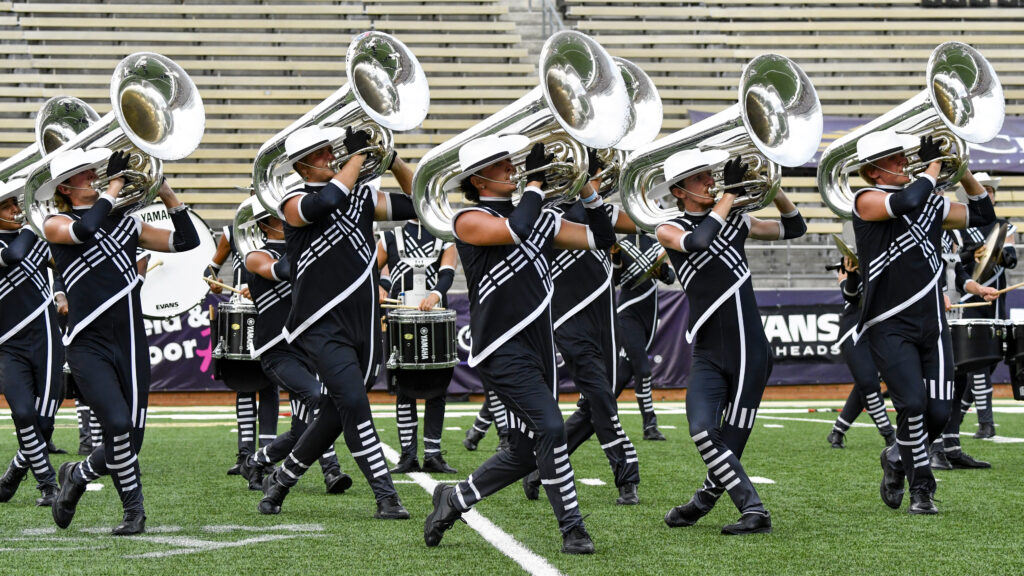One of the biggest deterrents people face in joining a drum corps is the cost. I have received several e-mails over the past few weeks, asking for suggestions on ways to pay for drum corps. I’ve also seen parents e-mailing alumni listservs and posting on message boards, asking what the average income of a drum corps family is so they’ll know how much to expect to pay.

Fear not, all ye who are light in the pocketbook! Drum corps is not as expensive as a year in college and need not constitute a heavy economic burden on a family. Not only is drum corps relatively inexpensive, there are also many alternatives to just writing a check to pay for tour fees. A note: All the dollar figures quoted in this column are based on my experience with various corps’ costs structures and are not meant to be a scientific survey of the activity! Every corps is different and you should consult your individual drum corps for specific financial information.
The average drum corps fee has been climbing in recent years as the price of gas and food — a corps’ two biggest expenses — go up. Of course most corps must raise fees every few years to reflect the rate of inflation, but even taking all that into consideration, tour fees are quite reasonable. Imagine how much the average teenager can spend in three months on food alone, and all of a sudden drum corps looks like quite a bargain! For the vast majority of corps, annual member dues (also called tour fees or tuition) — not including first-camp registration fees, monthly camp fees, or extra uniform expenses — sit somewhere just above or below $1,000.
Of course, the type of corps that you march with will in part determine your tour fees; the neighborhood corps that never travels outside of the state will cost significantly less than a Division I corps that does a full tour! However, both extremes of cost can be found in the top six alone, so higher-ranking does not by definition mean higher-costing.
Most corps have a number of fees in addition to the annual dues. These typically include a first-camp registration fee (from $50-$75), also known as an audition fee, which helps to cover the extra costs of photocopying, mailing costs, extra staff, food, and additional administrators required by the large number of auditionees that usually attend the first two camps.
Most corps also assess a camp fee ($25-$35) at each camp that, again, helps to cover things like food, photocopying, etc. Members of the guard will usually have an extra uniform fee to cover shoes, makeup, and the extra cost of guard uniforms; this is offset by the fact that most corps do not require their guard members to attend camps between January and April, due to the prevalence of the winter guard activity.
Most members will have a one-time expense for marching shoes ($20-$30), and some corps may require members to buy their own plumes and/or gloves (around $5 per pair). All in all, the average drum corps member should expect to spend between $2,000 and $3,000 on corps-required fees, not including travel expenses or spending money for the summer.
Of course, some corps may cost quite a bit more or less than this. Most corps offer various discounts, including a veterans’ discount (for example, $50 off per year of previous membership), a family discount ($100 off for every extra child in the corps), and an early bird discount (5 percent off tour dues if paid by January 31).
Most corps also offer various ways to work off dues, such as working in the corps’ office or doing manual labor on corps facilities on work weekends, and fund-raisers, such as a March-A-Thon or pledge drive. Most corps also have at least one scholarship to cover membership dues for a financially needy individual.
The quickest and easiest way to get help paying off tour dues is to search out sponsorships. Many members pay part or all of their annual dues by getting local businesses, their friends, and extended family to give them sponsorships.
Your corps can often provide you with a letter or similar document explaining the drum corps activity and what you will gain from your involvement in a corps, but those people who are best at obtaining sponsorships usually include a personal testimonial about their own love of the pageantry arts, the benefits they’ve gained over the years by participating in the pageantry arts, etc.
Then they dress up and actually go out and meet the business owners and managers they are canvassing face-to-face to better explain what the activity is about and how it benefits its members. It’s quite a bit of effort, but it pays off as you can often collect enough to pay not only for your tour fees, but also camp fees, uniform fees, and perhaps even your corps jacket.
Likely donors are generally local businesses who have a vested interest in the youth of a community, rather than large national chains or businesses, although you shouldn’t rule those folks out. Family friends, church members, and civic groups that support youth, the arts, or both, are also possible contributors. And don’t forget extended family members – even if your aunt and uncle can only give you $50, every little bit helps! Put the same effort into canvassing them as you would a business owner or civic organization.
Above all, the rules are to not be embarrassed to ask — people can’t help you if they don’t know of your need — and to not give up, even if you do get turned down quite a bit at first. People who are persistent and creative in their efforts are the ones that are successful. It is essential that you communicate with your corps administrators and staff if you anticipate having difficulties paying your dues. Most corps will be lenient if you are making a good-faith effort to pay as much as you can, when you can, and will allow you to finish paying your fees during or even after tour.
Your corps administration can also give you more ideas for fundraising opportunities or point you towards corps vets, fans or board members who may be interested in sponsoring you. I hate watching people use economics as a reason not to do drum corps.
While no one in the activity likes that it has to cost money to march corps, it is the unfortunate reality of the situation. However, every year young people who have every reason, economically, not to march corps manage to find away to pay off their tour fees. It does require some effort and ingenuity but it is certainly possible. I don’t normally advocate counting on money that is not yet in the bank, but when it comes to drum corps, I preach the idea of going to the November camp even if you’re not entirely sure how you’ll pay for the summer.
Don’t let the cost keep you from fulfilling your dream of marching! If you want badly enough to make it happen, you will be able to. Emily Tannert is a sophomore music education/percussion performance major at Louisiana State University in Baton Rouge, La., and holds a journalism degree from Northwestern University.
Emily aged out of the Glassmen in 2003 and was assistant tour manager for the corps in 2004 and 2005. You can contact Emily at [email protected].
Transitioning to the professional level





